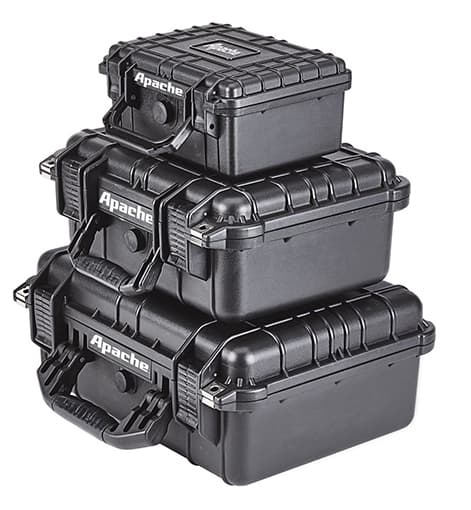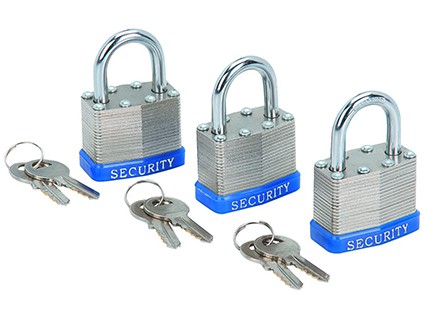We've all heard our fair share of TSA horror stories, and perhaps experienced some firsthand. Flying with your firearm may seem daunting, but fear not – We made this handy guide to help you have a hassle-free flying experience.
While we have made every effort to ensure the accuracy of this information it should not be relied upon as legal advice or when making important life decisions.
Packing Firearms and Ammunition
TSA regulations require all firearms and ammunition be secured in a locked, hard-sided case and transported as checked baggage only.
Securing Firearms
All firearms must be unloaded. Federal law defines a "loaded firearm" as "a firearm that has a live round of ammunition, or any component thereof, in the chamber or cylinder or in a magazine inserted in the firearm." Notice it doesn't say anything about the position of the slide. However, in addition to removing the magazine, I'd recommend also locking the slide back so it's apparent the gun is not ready to fire when the case is opened for inspection.
Magazines must be secured in the same case as the firearm itself.
Securing Ammunition
Shotgun shells and ammunition smaller than .75 caliber can be transported in the same case as the firearm itself. The ammunition must be "securely packed in boxes or other packagings specifically designed to carry small amounts of ammunition" (49 CFR 175.10(a)(8)). I put my ammunition in ammo boxes and then lock it inside my hard case.
Some airlines, like Delta, require "separation for cartridges" (e.g. a divided ammo box) while others may let you have the magazines loaded as long as they're not inserted into the firearm. Be sure to check your specific airline's requirements.
Regardless, you're limited to 11 pounds of ammunition so if you need more than that, such as for training, you'll want to consider shipping it or buying it when you get there.
Choosing an Appropriate Gun Case
There's certainly no shortage of gun cases on the market. But keep in mind, your firearm will be in someone else's possession, and the case you choose has to protect your firearm from damage and secure it against tampering. A durable and protective case isn't something you should skimp on.
While you can certainly pick up a cheap pistol case for around $10, it's not going to be nearly durable or secure enough for your needs. These flimsy plastic cases work great for carrying your guns to the range or storing them around the house, but you'll want something more heavy duty for your flight. Have you seen how airlines throw luggage around like it's nothing?
Perhaps the most durable and secure cases aren't even sold as "gun cases." I picked up one of these weatherproof hard cases from Harbor Freight (be sure to grab one of their 20% off coupons). It's impact resistant, provides IP65 level dust and water protection, and has two lock holes.
It's big enough to hold a firearm, a box of ammunition, and magazines. And the best part is it's very affordable, at less than half the price of comparable Pelican cases.

If you need something bigger, they have other shapes and sizes and even have a rifle/shotgun case. You're sure to find something that fits your needs.
Choosing the Proper Lock
Take whatever you know about luggage rules and put it on hold. When it comes to firearms, "only the passenger retains the key or combination" (49 CFR 1540.111(c)(2)): You should NOT use "TSA Approved" locks since they can be opened by someone other than yourself (i.e. TSA agents). For the rest of your luggage use TSA Approved locks. For your firearm case, don't.
If TSA wants the container opened for inspection, they're required to locate you and have you unlock the container. It is, therefore, absolutely critical that you pay special attention to airport pages and announcements because if they can't locate you to unlock the container, the firearm won't fly.
Be sure to check the lock's shackle size to make sure it will fit the holes in your case. If you opted for the case recommended above, the holes are approximately 7 mm in diameter, so make sure your lock(s) will fit the holes. I went with this set of 3 padlocks, also from Harbor Freight (Can you tell I like Harbor Freight?).

They're keyed-alike, so one key will open all 3 locks. I only needed two, so I've got an extra leftover, but for $6 I couldn't pass it up. They fit the case holes perfectly. The 1-1/2" opening also has just enough room to lock the lock, while not having so much room that the contents are accessible even while locked.
Checking Your Firearm with the Airline
In case we haven't already made it abundantly clear, firearms and ammunition can only be in checked baggage – no carry-ons.
Be sure to arrive at the airport early so you have plenty of time to go through the firearm declaration process. Time is your friend, and the more time you have the less stressful this process will be.
Prior to walking into the terminal make sure your firearm(s) and ammunition are secured in their locked case(s) like we talked about earlier.
You must declare each firearm each time you present it for transport. When checking in at the ticket counter let the airline attendant know you have a firearm that you need to declare. Some airports will call a TSA agent to the counter and others may escort you over to TSA.

Follow whatever directions they give you and everything will run smoothly. They'll likely inspect your firearm to ensure it meets all of their policies and regulations. They'll have you fill out an orange declaration card that goes in your gun case.
Once they let you know you're good to go be sure to still listen out for any pages or announcements in case they need you to re-open it for any reason (remember, you're the only one with the key or combination).
Each airline also has their own set of rules and regulations, and there may even be additional fees. Be sure to check with your specific airline to see if anything else applies.
Special Advisory to Travelers Through New York & New Jersey
If at all possible, avoid traveling or connecting through New York and/or New Jersey. Despite federal law that protects travelers, authorities in New York and New Jersey have been known to enforce state and local firearm laws against airline travelers who are passing through their jurisdictions.
If you are traveling through New York and/or New Jersey airports you may want to consider shipping your firearm(s) and ammunition to your destination, as even travelers in full compliance with federal law have been arrested or threatened with arrest.
Resources
- Transporting Firearms and Ammunition
- Press Release – TSA Advises Passengers Traveling with Firearms, Ammunition